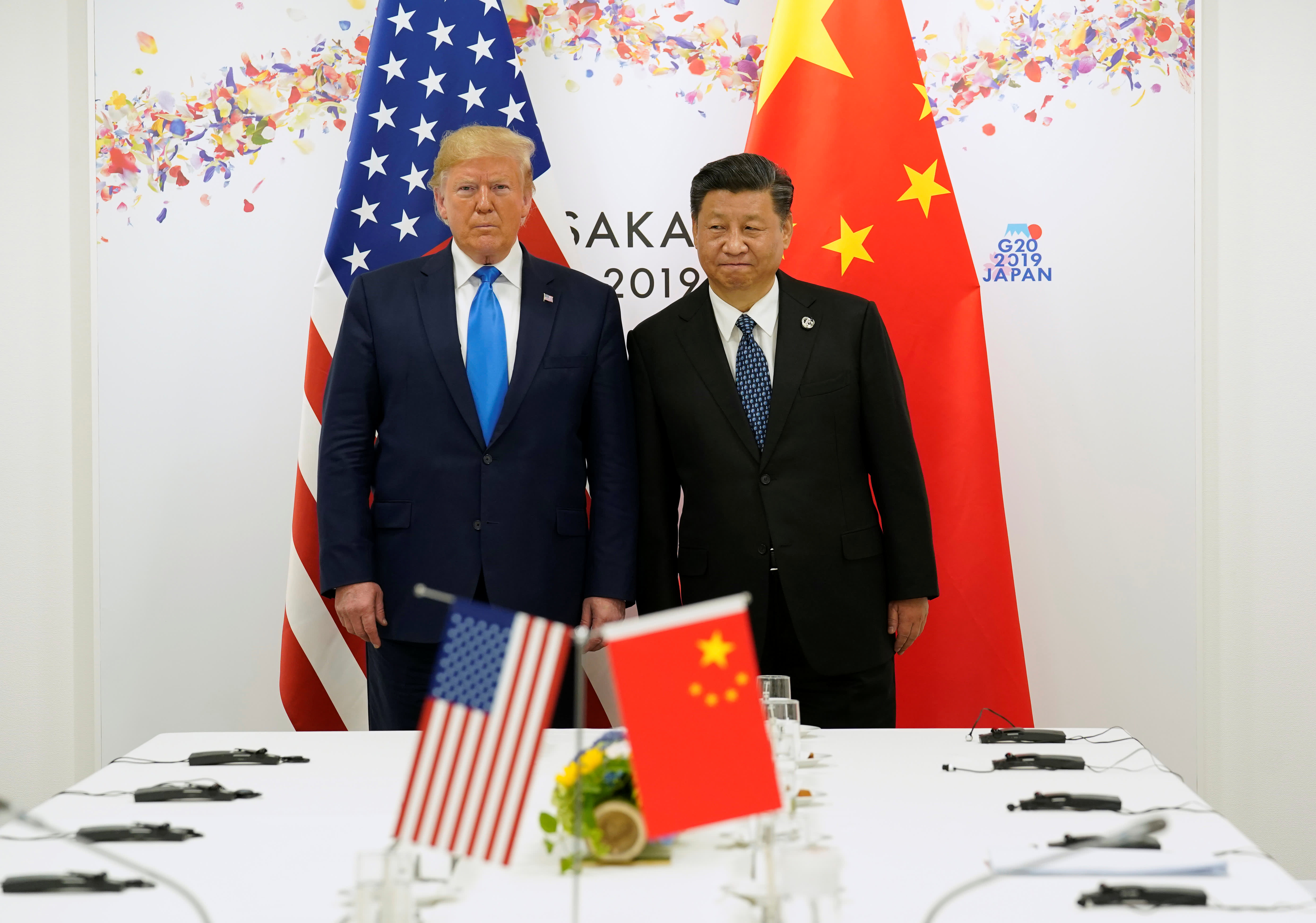
Stocks are surging on the 'trade truce' but it may be a short-lived rally, once investors consider it could take months of tough talks to get to a trade agreement and there still remains the risk of more tariffs.
Both Bank of America Merrill Lynch and Morgan Stanley say a stock market correction could be in the offing this summer, despite the fact the U.S.-China trade war cooled a bit this weekend.
President Donald Trump and China President Xi Jinping agreed in Osaka to hold off on new tariffs and to restart trade negotiations. Trump also said he could partially lift the ban on sales of some U.S. components to China's blacklisted telecom company Huawei, if there is no national security issue.
The S&P 500 Monday rose into record territory in a global equities rally, climbing wall above its previous high of 2,964. The S&P was up more than 1%, but pared gains after weak manufacturing reports
Trade sensitive stocks, like Apple and Caterpillar were higher. Semiconductor stocks also rallied, and those that do business with Huawei, like Micron saw sharp gains.
"We still expect a 10 percent correction during 3Q as this past week'send's agreement is viewed as a sell the news event," wrote Morgan Stanley chief U.S. equity strategist Mike Wilson.
At Bank of America, analysts were also skeptical.
"The fact that there was no major breakthrough is consistent with our 'no pain, no deal' framework: at the moment the economy and markets are not weak enough to incentivize the US to make compromises," noted Bank of America strategists.
President Donald Trump connects his success with the stock market's performance, and at record highs, the market is currently ignoring trade concerns. But if that changes and stocks weaken, many pros said he might move to complete the agreement. Trump tweeted Monday that the market has had the best first half in 1997, and that America is doing great.
"We expect a deal with China, but but it could take a large market correction to get there," the BofA strategists wrote. They expect a deal could come later this summer, and BofA's chief U.S. equity strategist Savita Subrahim says if there is a "real deal," the S&P could rally to as high as 3,100. However, additional tariffs could wipe 5% or more from the S&P.
Morgan Stanley's Wilson said he would fade the rally in junk and value and cyclical stocks, which have been rising on hope for a deal. He said there is a growing view that the Fed could and possible trade deal could stop economic slowing.
"We disagree with this conclusion and see increasing risks to growth and quality that could further accelerate the momentum unwind, but from the long side," he noted. Wilson said an accomodative Fed would cushion the blow, but not prevent a slowing.
In the bond market, the reaction was much more muted than in the stock market, and the 10-year yield was at 2.02% in morning trading, not much above Friday's level and in the middle of its intra-day range.
"I think it's just the fact that it's pretty similar to what we saw at the last G-20, back in December. While the cease fire is incrementally good news, it really doesn't change anything from a longer term perspective," said BMO rate strategist Ben Jeffrey. Jeffrey said the deal does not remove the economic impact of the 25% tariffs on $250 billion in Chinese goods that are already in place, and the bond market is reflecting skepticism.
"We're reading this as people are apprehensive in seeing this as an inflection point," said Jeffrey.
"The markets are likely to view the summit as a modest positive in the short run. But stepping back, we see several reasons for concern," wrote BofA strategists, pointing to the U.S. tariffs and also the nearly 20% tariffs on $100 billion of U.S. exports to China. "Tariff termites have been eating away at growth in China and its trading partners in Europe and Asia-Pacific, some of whom have very little room for policy easing. In the US, the manufacturing sector has started to weaken."
ISM manufacturing data, released Monday, slipped to 51.7 from 52, but was better than the 51 expected. New orders in the report were at 50, just barely signaling expansion, and down from 52.7 in May.
The risk of another round of tit-for-tat tariffs remains elevated. We also expect tariffs on a growing list of products and countries in the coming quarters. In addition, if the dollar remains strong despite Fed cuts, we would not rule out FX intervention.
BofA strategists say they worry that the Fed will act to help the economy but it could just prolong the trade war.
"The Fed is determined to raise inflation by sustaining above-trend growth. To this end it seems willing to offset the negative impact of the trade war on the economy. But the risk is that the "Fed put" could encourage an even tougher stance on trade, which would trigger even more Fed accommodation, and so on. The end result would be a loss of Fed policy ammunition, with an economy that is still soft," they noted.
Wilson said the market will also face weaker earnings reports, and that corporate guidance could be negative since earnings estimates for the second half and next year remain too high.
"The second half of the year tends to be a seasonally weaker time for earnings revisions and the underperformance of seasonality in revisions seen year to date is not an encouraging sign. If management teams hold out hope for a recovery by linking growth to a resolution on trade, we think it just delays the disappointments and the market likely will not buy it like it did in January," Wilson noted.
https://www.cnbc.com/2019/07/01/stocks-rise-in-trade-rally-but-strategists-warn-of-market-correction.html
2019-07-01 15:10:59Z
CAIiELLlHQluHjvSckilZWp3VsIqGQgEKhAIACoHCAow2Nb3CjDivdcCMJ_d7gU
Bagikan Berita Ini














0 Response to "Trade ceasefire rally could be short-lived, market strategists warn - CNBC"
Post a Comment